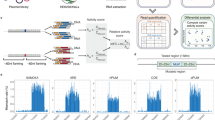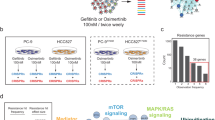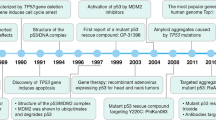Abstract
Recent studies have suggested that different mutation types within the core domain of the tumour suppressor protein p53, i.e. DNA contact mutations and structural mutations, confer different biological properties. We have analysed in 86 head and neck squamous cell carcinomas (HNSCC), whether these p53 mutation types have a differential clinical impact. Thirty-seven missense mutations were identified. Thirteen of these (36%) were DNA contact mutations, occurring in the L3 loop, in the H2 loop sheet helix motif, in the S10 β strand and in Zinc binding residues. Microsatellite marker analysis revealed a selective association between these mutations and the loss of wild-type alleles (100% LOH vs 50% LOH in tumours with structural mutations; P=0.0034, Fisher's exact, 2-tailed). In comparison to structural mutations or to the absence of mutations in the core domain, DNA contact mutations were associated with higher tumour stages (84.6% vs 62%), a higher incidence of lymph node metastasis (91.7% vs 56%; P=0.014, Fisher's exact, 2-tailed), a shortened recurrence-free survival (8.1 months vs 23.7 months, P=0.047, log rank test) and overall survival (11 months vs 29.2 months; P=0.003, log rank test). The latter was also the case when only stage IV tumours were analysed (P=0.0055, log rank test). These data indicate that in HNSCC, TP53 DNA contact mutations confer a strong selection pressure to eliminate wild-type alleles, and that they result in an accelerated tumour progression and reduced therapeutic responsiveness.
This is a preview of subscription content, access via your institution
Access options
Subscribe to this journal
Receive 50 print issues and online access
$259.00 per year
only $5.18 per issue
Buy this article
- Purchase on Springer Link
- Instant access to full article PDF
Prices may be subject to local taxes which are calculated during checkout
Similar content being viewed by others
Author information
Authors and Affiliations
Rights and permissions
About this article
Cite this article
Erber, R., Conradt, C., Homann, N. et al. TP53 DNA contact mutations are selectively associated with allelic loss and have a strong clinical impact in head and neck cancer. Oncogene 16, 1671–1679 (1998). https://doi.org/10.1038/sj.onc.1201690
Received:
Revised:
Accepted:
Published:
Issue Date:
DOI: https://doi.org/10.1038/sj.onc.1201690
Keywords
This article is cited by
-
Time series analysis of TP53 gene mutations in recurrent HPV-negative vulvar squamous cell carcinoma
Modern Pathology (2019)
-
Expression levels of miR-34-family microRNAs are associated with TP53 mutation status in head and neck squamous cell carcinoma
European Archives of Oto-Rhino-Laryngology (2019)
-
Mutational profiling can identify laryngeal dysplasia at risk of progression to invasive carcinoma
Scientific Reports (2018)
-
Reactive oxygen species and p21Waf1/Cip1 are both essential for p53-mediated senescence of head and neck cancer cells
Cell Death & Disease (2015)
-
Differentiation of irradiation and cetuximab induced skin reactions in patients with locally advanced head and neck cancer undergoing radioimmunotherapy: the HICARE protocol (Head and neck cancer: ImmunoChemo and Radiotherapy with Erbitux) – a multicenter phase IV trial
BMC Cancer (2013)



